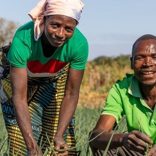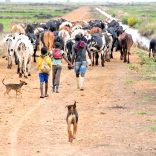Mozambique: Farming through drought
Mozambique: Madal invests in reviving coconut groves in Zambézia

Photo: Notícias
Over 31,000 hectares (76,602 acres) of coconut plantations in five districts of Zambézia province are being renovated by the Madal Group.
The objective of Madal, a Mozambican company with an annual investment of around 64 million meticais, is to explore the potential for the production and sale of coconut in Zambézia province.
The Madal Group signed a protocol with Zambeze University last week for the joint implementation of an integrated coconut palm repopulation project covering the districts of Chinde, Maganja da Costa, Inhassunge, Pebane and Nicoadala.
The agreement is valid for four years, and provides for the involvement of students and teachers of the university’s Agricultural and Forestry Engineering courses.
Speaking at the signing ceremony, Madal Group administrator João Lameiras recalled that Zambézia was once the largest producer of coconuts in Mozambique, and home to one of the largest ‘palmares’ in the world.
Today, Lameiras said, a large part of the vast coconut plantations which formed the basis of the province’s economy had been destroyed by the lethal leaf-yellowing disease.
“The protocol we just signed will allow us to carry out research into the causes of lethal yellowing and define solutions, returning Zambézia to its status as largest coconut producer in the country,” he said.
João Lameiras also said that Madal intended to re-assert itself as “a successful commercial enterprise of agricultural and forestry development, setting environmentally friendly standards of social responsibility”.
“We want these actions to result in community growth and in equitable and integrated improvements in the gross domestic product (GDP) and in local infrastructure, so that we have sustainable gains in income, education and opportunities in economic alternatives,” he stressed.
In turn, the Rector of UniZambeze, Bettencourt Preto Sebastião Capece said that his institution would honour the protocol signed through the production and dissemination of science, technology, culture, research and extension, focusing on natural and social sciences and valuing human knowledge for the country’s sustainable development.
The memorandum gives Zambeze University the role of identifying and making available students and faculty in the areas of Agronomic and Forestry Engineering to develop research studies on coconut palms in agroforestry systems and edit technical manuals for use by Madal.
It will also supervise the activities of students and ensure the implementation of the project in the terms defined, as well as producing and making available reports and scientific information resulting from the experience of implementing the initiative.
The province of Zambézia meanwhile continues to lose coconut plantation acreage to the lethal palm leaf-yellowing disease.












Leave a Reply
Be the First to Comment!
You must be logged in to post a comment.
You must be logged in to post a comment.